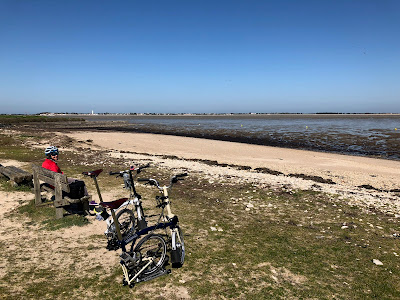
La Dame de Chambrille

Poitou-Charentes myths, legends and history
La Dame de Chambrille
One of my favourite discoveries this year was a mysterious granite rock formation (a geological oddity in an area where limestone prevails), located along a footpath, in the woods, not far outside of La Mothe-Saint-Héray, Deux-Sèvres. Its towering presence is enhanced by the legend surrounding it, and the fact ‘she’ has been named, La Dame de Chambrille (the lady of Chambrille).
 |
| The towering presence of La Dame de Chambrille |
Once upon a time, many years ago, Berthe, the beautiful daughter of a local squire fell in love with her neighbour, Guy de Tremont. Unfortunately, the elderly Baron de Chambrille asked for Berthe’s hand in marriage, to which her father agreed, despite poor Berthe’s despair. Some time passed after her wedding, when, by chance Berthe and Guy crossed paths once again, and soon began meeting in secret every night, only parting at the first light of dawn.
The Baron became suspicious and followed his wife, watching the lovers before stabbing them one morning in a fit of jealousy. Berthe was petrified and became the rock with a profile of a lady’s face that bears her name, the Dame de Chambrille. Guy dragged himself, despite bleeding heavily, towards his home, where he died, his blood becoming the little red pebbles still visible in the stream that runs through the valley, his tomb, a flat rock found at the water’s edge.
 |
| The red pebbles of Guy de Tremont |
Like many similar tales, it might be a sad one and a little grisly, but I do love the magic of a good fairytale, and you have to agree, that rock does have an uncanny likeness to a damsel in distress, staring down at the stream where her lover’s body lay.
La Fouace
La Mothe-Saint-Héray is also home to a local delicacy that we have sadly yet to taste, though it’s not through want of trying. The fouace is a round brioche bun, but it’s not just a boulangerie speciality, it too has an interesting story behind it. The name comes from the Roman word ‘foacius’ meaning to be cooked under the ashes, or in the hearth, and it is from this same word you get fougasse from Provence and the foisee from Burgundy, among just a few to be found all over France. The Mothais fouace is said to be the real fouace, as not only was it mentioned in one of the Gargantua books by François Rabalais in 1534 but even in the Middle Ages, pilgrims on the Compostela route to Santiago would detour to stock up on these local delicacies, thanks to the reputation and quality of the local flour. I am always rather excited by a story that links the Chemins de Saint Jacques with food (see here).
Until the war there were twelve fouaciers in La Mothe-Saint-Héray, but more recently the patisserie Favreau was the only holder of the secret recipe, that tradition dictates is only passed down to those who take over the business. Sadly, the Favreau patisserie closed in 2021, and when no buyer could be found, the recipe and manufacture moved to a local Mothais farm. It is now sold in the local COOP, but only from Wednesdays to Sundays.
In the spring of 2022 when we set off on our loaded Bromptons to follow the Sèvre Niortais river from its source to the Atlantic, La Mothe-Saint-Héray was our morning coffee stop on day one. We arrived on a sunny, Monday morning during the April school holidays, to find all the boulangeries were closed, despite our need for fuel with our coffees (thankfully the bar was open). Let’s just say by the time we arrived in Saint-Maixent-l’Ecole at lunchtime, I was running on empty. Returning one summer afternoon this year, to explore a bit more, we were able to buy our favourite flans at one of the boulangeries, that we ate in La Dame de Chambrille’s woods, but the fouace once again eluded us.
 |
| The Orangery at La Mothe Saint Héray |
The Orangery in La Mothe-Saint-Héray is also worth a visit, and as it’s always good to have a reason to return, maybe next time we will be lucky enough to enjoy a stroll around the beautiful gardens and a taste of a fouace.



























